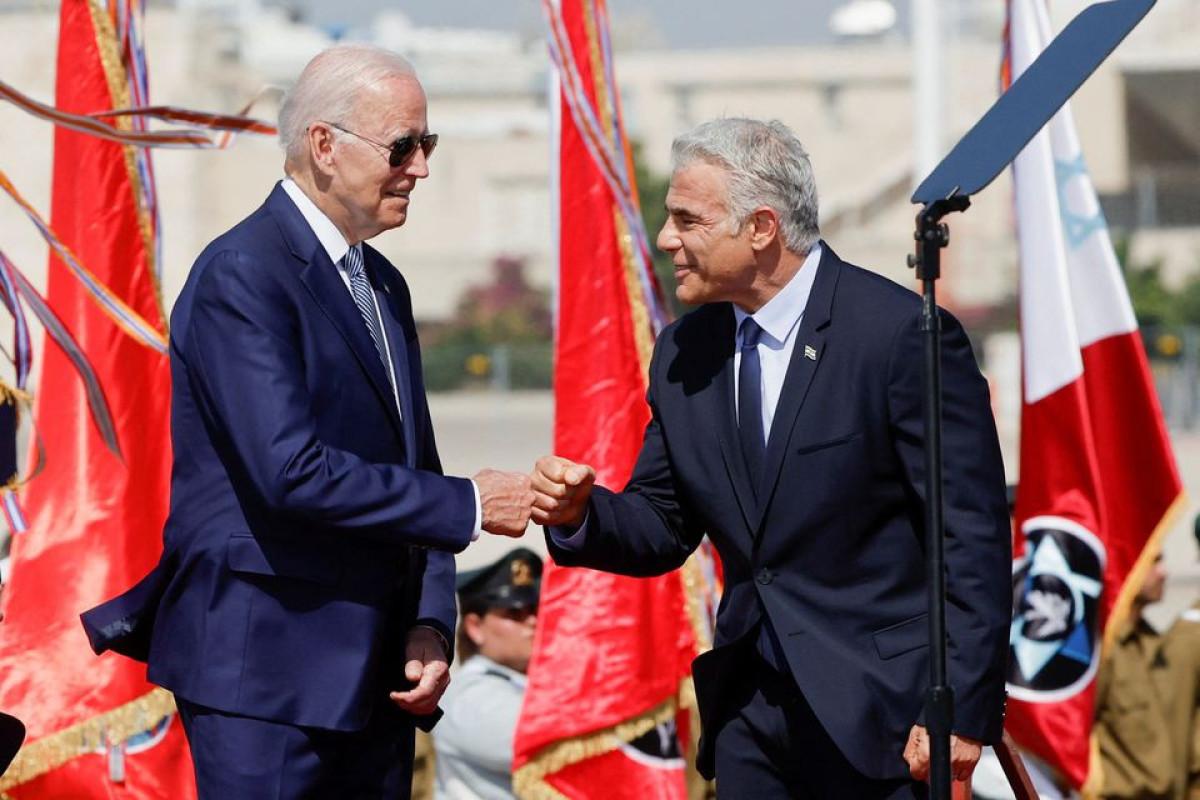Biden in the Middle East: Slight Success Amid Acute Controversy Review by Maxim Petrov
US President Joe Biden said the United States "will not withdraw" from the Middle East in order to prevent "a vacuum to be filled by China, Russia or Iran." This statement was made on Saturday, July 16, at a summit of Persian Gulf leaders in the Saudi city of Jeddah.
In fact, Biden's visit to Israel and Saudi Arabia is linked with the exact opposite trend. The United States is not completely withdrawing from the Middle East altogether, but it is no longer able to devote the same attention to it as before. The US National Security Doctrine calls Russia an acute threat and China "the most important strategic rival and major challenge."
Engaged in an acute confrontation with Russia in Ukraine, the US is simultaneously forced to shift its attention and channel more resources to East Asia in order to meet the strategic challenge posed by the emergence of a new superpower - the PRC. Military and political confrontation with Moscow and growing economic and geopolitical competition with Beijing make it difficult for the US to pursue an active Middle East policy - American resources are not infinite. In addition, the shale revolution and the gradual transition of economically developed countries to green technology have increased America's autonomy from Middle Eastern oil. Altogether, the Middle East's importance to the United States is diminishing.
However, paradoxically, all this increases the importance of the region for American diplomacy. To maintain its influence there in today's environment, Americans need a strong political-military bloc of US-friendly states to contain an unfriendly Iran and its allies and to control Chinese and Russian infiltration into the region. And also to influence the market price of oil.
Such a bloc is created on the basis of the Abrahamic agreements normalizing relations between Israel and the Arab monarchies of the Persian Gulf - the UAE and Bahrain. In addition, there is a rapprochement between Israel and Egypt, the largest Arab country, which together with Israel is developing gas fields in the Eastern Mediterranean. Israel has long had diplomatic relations with Egypt (the country is a close ally of Saudi Arabia and the UAE). Morocco has also joined the Abrahamic agreements.
In this regard, it is very important for the Americans to achieve further rapprochement between the two key countries of the potential alliance, Saudi Arabia and Israel. The countries have long cooperated militarily and economically, but the Saudis have not yet joined the Abrahamic agreement.
Another important task for Biden was to achieve an increase in oil production by Saudi Arabia. The Americans need this in order to bring down too high oil prices, whose rise is caused by the Russia-Ukraine crisis. Current prices are burdensome for the world economy.
Finally, it was important for the US to demonstrate proximity with Israel's leaders and a common anti-Iranian line with them. Overall, the visit to Israel was supposed to be part of a plan aimed at bringing Riyadh and Tel Aviv closer together.

However, two factors made the situation worse in terms of advancing US interests.
First, Biden's relationship with Saudi Prince Mohammed bin Salman (MBS), the de facto ruler of the country, did not work out. Biden had previously accused him of killing journalist Jamal Khashoggi and said that Saudi Arabia was a pariah state. But as Gregory Gause points out in his article for Foreign Affairs, the fact that Biden decided to bury the hatchet with the Saudi crown prince is a necessary and understandable reaction to what is happening in the world, "not only to the broken politics of the Middle East but also to the global turmoil caused by the conflict in Ukraine." It is a recognition that to achieve some order in the messy Middle East, one must deal with rulers who lead relatively stable states and exert influence beyond their borders. Such rulers can be found in Egypt, Iran, Türkiye, and even Syria. You can certainly find them in Saudi Arabia. However, if Biden has decided to stabilize relations with the Saudis, it does not mean that the rulers of the country have forgotten about his threats.
Second, Saudi Arabia demands that Israel normalize relations with the Palestinians. Today, the Arab-Iranian controversy has come to the forefront, weakening the Arab-Israeli conflict and pushing the Palestinian issue into the background. At the same time, the Iranians support the Hussite rebels in Yemen, with whom the SA and the UAE are at war, Iran has great influence in Iraq, which greatly worries the Gulf Arabs, the Iranians have repeatedly attacked tankers in that region, etc. All this makes the Sunni Arab monarchies of the Persian Gulf look for allies. Such an ally for them at the moment is Israel, an irreconcilable opponent of Iran, which also possesses modern technology and high-precision weapons. The military and financial alliance between the Arabs and Israel, combining huge amounts of oil money with modern technology, could in time bear fruit.
Nevertheless, Saudi Arabia, unlike the UAE, is trying to play the role of the dominant military, political, economic, and ideological force in the Arab and Sunni Muslim worlds. And so it is more sensitive to the Palestinian problem. As long as Israel controls the territories in the West Bank, home to 3 million Palestinian Arabs, and blocks Gaza, home to another 2 million, it is difficult for the Saudis to join the Abrahamic agreements. Israel's actions provoke negative reactions not only among the Palestinians, but also in the Arab and Muslim worlds, and the Saudis cannot ignore this.
However, there are some results of Biden's visit. The US announced the transfer of disputed territory to the kingdom. Back in 2017, Egypt agreed to transfer two islands in the Strait of Tiran to Saudi Arabia. However, Israel's agreement to this decision has only now been received. It is reported that US troops will leave the area. In exchange, the Saudis have agreed to allow planes flying to or from Israel to cross Saudi airspace. This will, for example, allow Israeli Muslims to make pilgrimages to Mecca - meaning that these passengers will now be able to avoid costly and time-consuming transfers. However, the decision, to say the least, is not identical to the establishment of diplomatic relations and normalization with Israel.
Perhaps Biden expected MBS to publicly announce its intentions to increase oil production. But he received an evasive response. Saudi Arabia said it would continue to "balance" the global oil market so there would be no shortage. Some experts, citing a number of MBS statements, believe that the Saudis will increase oil production by 3 million barrels in the coming months, but others express doubts about this, pointing to the uncertainty of the Saudi position. Saudi Arabia is tied to the policies of OPEC+ exporting countries, is currently benefiting enormously from the high price of oil, and it is still a very big question whether it is interested in trying to bring prices down, even if the US strongly ask to do so.
The results of Biden's visit to Israel were no less controversial. The parties came to a mutual understanding that Iran's enrichment of uranium to military levels (90%) or its development of nuclear weapons, i.e. the ability to mount a nuclear warhead on a ballistic or cruise missile, would require a "plan B" against Iran, in other words, a military operation. So far, Iran has not enriched uranium to this level.

US President Joe Biden and Israeli Prime Minister Yair Lapid, while in Jerusalem, signed a declaration on the strategic partnership between the two countries; the document is called the "Jerusalem Declaration." It underscores US readiness to support Israel's security, with the US and Israel pledging to work together to counter Iran's pursuit of nuclear weapons.
At the same time, despite the Israeli government's insistence, the US does not want to set a deadline for negotiations about Iran's nuclear program and does not want to cross the "red line" that would turn talk of an anti-Iranian military operation into action.
Major General Amos Yadlin, former head of Israeli military intelligence, defines this red line as a "trigger line," or a certain line, "the crossing of which by Iran would trigger a concerted US-Israeli mechanism that represents a real, credible and powerful military option." But as political analyst Ben Caspit points out in his article for Al-Monitor, there is currently no agreement between Israel and the United States on such a red line with regard to Iran.
"America is a superpower," a senior Israeli security official told Al-Monitor on condition of anonymity. - "It is reluctant to set such deadlines and very reluctant to make such statements because when you are a superpower, red lines matter. When someone crosses them, you have an obligation to act. But Biden doesn't want to commit himself to that kind of obligation."
So despite Biden's solemn reception in Israel, its leaders cannot be completely satisfied with the results of the visit.
As for the containment of China and Russia in the Middle East, Biden's success is not great either. As the Israeli political analyst Zvi Bar'el emphasized in his article for Haaretz, "Saudi Arabia already has extensive trade and investment agreements with both Russia and China. It has defied Western sanctions imposed against Russia, as has the United Arab Emirates. Construction of a $25 billion Russian nuclear reactor has already begun in Egypt. China, meanwhile, already controls much of the new industrial zone being built along the Suez Canal, and Chinese companies are constructing Egypt's administrative capital near Cairo. China is also expected to build 1,000 schools in Iraq, and it is in an advanced stage of negotiations with Qatar to develop the largest gas field in the world and long-term purchase of Qatari gas. And a long-term agreement between China and Iran provides for China to invest hundreds of billions of dollars in Iranian infrastructure in exchange for cheaper oil and naval outposts in the Persian Gulf."
It is worth remembering, however, that this agreement with China will not be implemented until US sanctions on Iran are lifted, since the Chinese do not want to expose themselves to US sanctions and risk their money.
Nevertheless, a US-Arab alliance against China is something the Arab countries cannot afford today. On the contrary, Saudi Arabia's and the UAE's trade with China is growing steadily. The same is true of Sino-Israeli relations. The PRC views Israel as a source of high technology. Large Chinese companies are constantly stepping up investments in Israeli high-tech.
Be that as it may, the US President's trip to the Middle East produced minor results. It may have set the stage for strengthening the Arab-Israeli anti-Iranian coalition. But if anyone had hoped for more, he has been disappointed.








